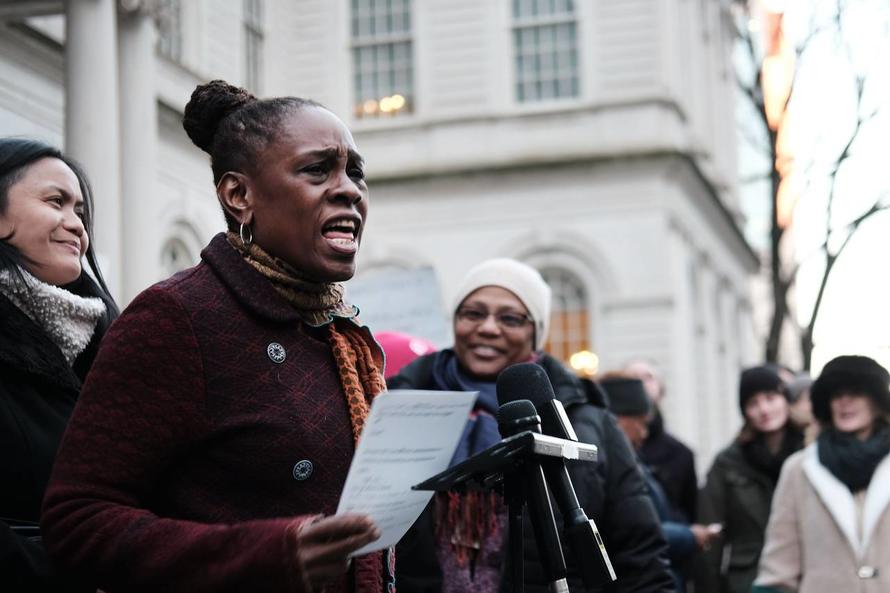An $850 million program to address mental health in New York City has operated with little to no transparency since its inception in 2015. Perhaps most troubling, the city has been evasive when asked for an accounting of the program, called ThriveNYC.

Spearheaded by Mayor Bill de Blasio’s wife, Chirlane McCray, ThriveNYC encompasses “a variety of initiatives,” according to Politico – making it difficult to pinpoint exactly how the city is spending taxpayer dollars on the program. Thrive is meant to help low-income minorities without access to mental health care deal with issues such as substance abuse, depression and suicide.
POLITICO spoke to more than 16 people, including elected officials, advocates, representatives of community organizations, researchers and consultants who said that although it is crucial for the city to invest in mental health resources, they did not know whether Thrive was successful and said the city has an obligation to publicize its numbers and how it compares to the goals it set out to accomplish. Some requested anonymity for fear of retaliation while others were more vocal in their critiques. –Politico
What’s worse, ThriveNYC has been evasive when asked by Politico for a line-item budget in October, asking twice for extensions. When Politico was finally able to obtain two budget breakdowns – one from the city’s Independent Budget Office, and another from City Hall – there were significant discrepancies in how money was spent under the initiative.
While the City Hall budget shows $594 million spent since ThriveNYC was kicked off in 2015, the IBO budget shows $816 million. City Hall and IBO both suspect that the Office of Management and Budget included fewer programs in the City Hall accounting, however the discrepancies nonetheless illustrate the difficulties in tracking the program.
The three-year-old program now has 21 employees and an office budget of $2 million, according to Susan Herman, who manages the office.
According to the Wall Street Journal, “Councilman Chaim Deutsch, who represents parts of Brooklyn including Brighton Beach, said he hasn’t seen ThriveNYC public outreach efforts in his district, and he had a difficult time registering for a mental first-aid training, one of the signature efforts of ThriveNYC.”
“With a $250 million budget, I should already be sick of ThriveNYC,” said Deutsch. “I have not seen anything.“
According to Herman, however, some 100,000 people have been trained to provide mental-health “first-aid” to people in crisis. Around half of those who have been trained are city workers. Meanwhile, the city’s crisis helpline – managed by ThriveNYC, has received over 250,000 calls, texts and chats in 2018.
Unfortunately, this data isn’t enough to accurately gauge whether ThriveNYC is a corrupt slush fund which has also provided meaningful services, or a well-oiled machine that simply hasn’t found a way to account for its successes.
While it plans to be more deliberate in the future, Thrive staff did not provide internal goals or benchmarks by which to judge its progress to this point.
For instance, Thrive’s metrics show that between July 2016 and October 2018, 189,070 Naloxone kits were distributed throughout hospitals, syringe exchange programs and other sites where opioid overdose is common. But there is no corresponding data on how many were used or how effective the outreach was.
Social media ads promoting Thrive have reached millions of people, according to the metrics, but the data doesn’t show how many people actually used the program after learning about it.
In the case of diversion programs, which aim to keep individuals with mental health and substance use problems in treatment instead of jails, Thrive only tracks the number of people released under supervision and those screened during pre-arraignment — not if or how city-funded intervention worked. –Politico
One metric in which ThriveNYC appears to have failed is screening new mothers for depression, after 29 hospitals responsible for more than 78,000 annual births committed to counseling, referred by Thrive.
According to Politico, they haven’t come anywhere near their goal – screening just 28,560 new mothers between September 2016 and October 2018, according to data provided by Thrive. As a result, just 570 of the estimated 12,000 – 15,000 women suffering from postpartum depression were reached.
“If we want to reach all these women, we need to start somewhere. We can’t turn on a switch one day and then screen 120,000 women a year,” said Gary Belkin, Thrive’s policy and strategy chief during an interview.
“It’s a big city, there must be thousands of OB-GYN providers in communities, in isolated offices. We can’t have a universality in this from day one,” added Belkin – who maintains that the program has been an overall success.
“We’ve actually built the first rational approach to the real scope and breadth of the need. And the depth issue, I don’t know of many city initiatives that have so quickly touched so many New Yorkers in such a short period of time.”
That said, nobody really knows how well the program is doing given its massive transparency issues.
via ZeroHedge News https://ift.tt/2IJ4rPm Tyler Durden